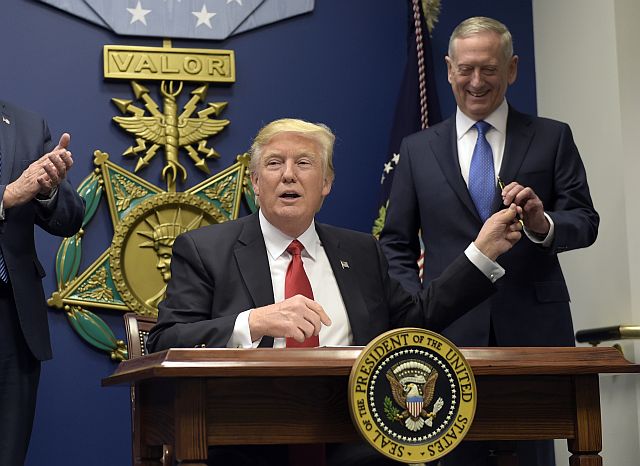
President Donald Trump hands Defense Secretary James Mattis(right), a pen after he signed an executive action on rebuilding the military during an event at the Pentagon in Washington, Friday. (AP PHOTO)
WASHINGTON — President Donald Trump on Friday barred all refugees from entering the United States for four months — and those from war-ravaged Syria indefinitely — declaring the ban necessary to prevent “radical Islamic terrorists” from entering the nation.
The order immediately suspended a program that last year resettled to the US roughly 85,000 people displaced by war, political oppression, hunger and religious prejudice. Trump indefinitely blocked all those fleeing Syria, where a civil war has displaced millions of people, and imposed a 90-day ban on entry to the US from seven Muslim majority nations.
“We want to ensure that we are not admitting into our country the very threats our soldiers are fighting overseas,” Trump said as he signed the order at the Pentagon. “We only want to admit those into our country who will support our country and love deeply our people.”
Trump said the halt in the refugee program was necessary to give government agencies time to develop a stricter vetting system. But the order did spell out what additional steps he wants the Homeland Security and State departments to take.
The US may admit refugees on a case-by-case basis during the freeze, and the government will continue to process requests from people claiming religious persecution, “provided that the religion of the individual is a minority religion in the individual’s country.”
In an interview with CBN News, Trump said persecuted Christians would be given priority in applying for refugee status.
“We are going to help them” Trump said. “They’ve been horribly treated.”
The order was signed on Trump’s most robust day of national security and foreign policy at the start of his presidency, marked by a meeting with British Prime Minister Theresa May and a lengthy phone call with Mexican President Enrique Pena Nieto.
As a candidate, Trump called for a temporary ban on all Muslim immigration to the US, he later shifted his focus to putting in place “extreme vetting” procedures to screen people coming to the US from countries with terrorism ties.
The State Department said the three-month ban in the directive applied to Iraq, Syria, Iran, Sudan, Libya, Somalia and Yemen — all Muslim-majority nations.
Disclaimer: The comments uploaded on this site do not necessarily represent or reflect the views of management and owner of Cebudailynews. We reserve the right to exclude comments that we deem to be inconsistent with our editorial standards.
